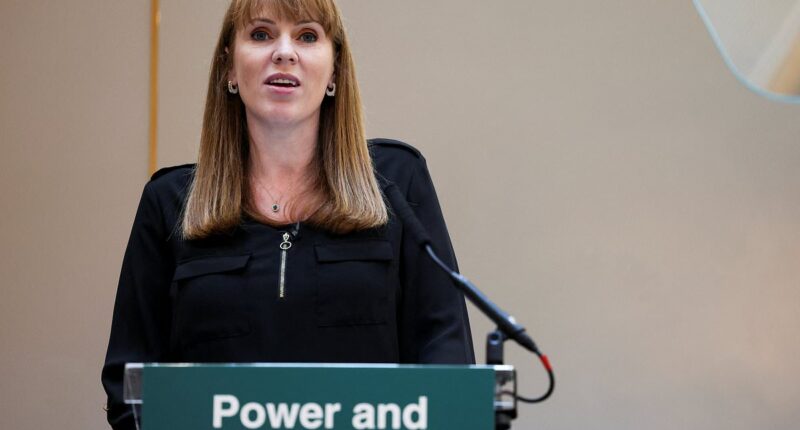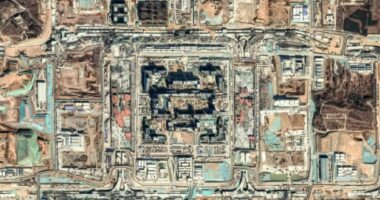Concerns are growing over the impact on local communities of the Labour Party’s proposal to establish ‘super-councils’ as part of local government restructuring, which has been criticized for potentially leading to higher taxes.
Angela Rayner’s initiative for ‘devolution revolution’ is set to introduce more directly elected mayors, granting them the authority to levy a ‘mayoral precept’ in addition to regular council taxes in many areas of England.
Under her plan, regions currently operating with a two-tier system of district/borough and county councils will be consolidated into a single governing body responsible for approximately 500,000 residents.
But these will then come together in mayor-led ‘strategic authorities’ covering areas with a population of at least 1.5million, with powers over things like planning and public transport.
Labour has insisted that the plan does not amount to super-councils and will increase local democracy, as decisions taken in Westminster are devolved to regional leaders.
But the White Paper admits that one of the aims is to ‘reduce the number of politicians’ involved in decision-making, raising fears that they could in fact lessen democracy.
There are also questions over whether elections due to take place in May will happen for authorities facing the axe in 2027.
Ms Rayner has already signed off on the creation of mayors in Greater Lincolnshire and the combined authority of Hull and East Yorkshire, which are set to be elected next year.
Hampshire, Sussex, Kent, Essex and Cheshire are thought to be next to bid to have a Mayor.
See what the changes may mean in your area in our graphic below:

The reforms may also force councils to delay elections organised for May 2025 as two-tier authorities are replaced with ‘strategic authorities’ (file image of a polling station)
Unveiling the plans yesterday the Deputy Prime Minister Ms Rayner said England will go from one of the ‘most centralised’ nations to one where local leaders ‘with skin in the game’ have significant powers.
This will include an attempt to give everyone a directly elected Mayor instead of the current hybrid system, where there are County and District Councils which handle different duties, as well as Unitary Authorities.
Existing combined authority mayors already levy a precept on top of council taxes in Manchester, Liverpool and Cambridgeshire.
But the Conservatives said that the document sends ‘a very clear message’ to authority leaders ‘that this Government feels that the men from Whitehall know best what their place needs, not bottom-up local leadership, but top-down templates for local government’.
Conservative shadow local government minister David Simmonds told the Commons: ‘Instead of genuine devolution, what this White Paper sets out is a reductive approach.
‘It’s a mishmash of new tiers, new taxes, taking decision-making further distance away from residents, and if the experience of London is anything to go by, costing them a fortune at the same time.’
Vikki Slade, the Liberal Democrats’ local government spokeswoman, said that when councils in Bournemouth, Christchurch and Poole merged in 2019 to create a single authority, it left taxpayers ‘not convinced that large unitaries work for them’.
And there was also pushback in the Commons from Labour MPs, with Cat Smith, who represents Lancaster and Wyre, warning Local Government Minister Jim McMahon: ‘To many of my constituents, this looks a lot like a one-size-fits-all model that works for Greater Manchester, which he represents quite ably, but doesn’t necessarily work for the rural English counties.’

Unveiling the plans yesterday the Deputy Prime Minister Ms Rayner said England will go from one of the ‘most centralised’ nations to one where local leaders ‘with skin in the game’ have significant powers.
Mr McMahon rejected ‘the one-size-fits-all argument any more than to say that councillors work in some areas but not others, members of Parliament work in some areas but not others’.
He added: ‘In the end, mayors, when given the powers and the resources, can achieve change in partnership with local leaders.
‘We are not creating supercouncils. We are creating a strategic authority that gives power from this place downwards and allows councillors to have far more power.’
Taking questions about county council elections due in 2025, the minister said ‘the assumption is that elections in counties are taking place as planned with the exception of those areas who actively come to us to say that they want reorganisation discussions, and they have a proposal that they can work up’.
There would be no elections for an authority which has confirmed its reorganisation plans, with voting postponed until a ‘shadow authority’ emerges.
On the process of creating the new authorities, he added: ‘The Government’s role is to invite and to receive, it’s not our job to draw the maps that then follow, it’s for local areas to do that.’
Ms Rayner talked up new Mayoral powers, adding: ‘Mayors will be hard wired into the fabric of how we govern and will lead the way on house, building, transport skills, and more. Too often, mayors’ hands are tied by Whitehall, even when it comes to allocating their own budgets.
‘So we will create a clear and transparent route for all mayoral combined authorities to receive an integrated settlement. This means moving resources between projects that matches what their people need.’
She also said ministers will be able to ‘knock heads together’ in areas which can’t agree on coming together.
The deputy Prime Minister added: ‘Devolution is a journey, and some will need time to decide the course they wish to follow, and we will give local leaders time and space to do this, but our ambition is clear. We want to fill the map with devolution.
‘Our manifesto pledged to give everyone access to devolved power.’
But she was accused of giving local people power with one hand while taking away democracy with the other after suggesting that authorities undergoing reorganisation could see their 2025 elections delayed.
All 21 county councils in England are currently up for election on May 1, as well as 10 unitary authorities.
Ms Rayner suggested central government would not interfere in the process, but that any decisions would be made from the ‘bottom up’. Officials are believed to be expecting a slurry of requests to postpone next year’s polling.
Earlier, Local Government Minister Jim McMahon told LBC: ‘This is an open invitation for councillors who want to be part of an early tranche of reorganisation and devolution to come forward.’
‘At the moment, the assumption is that elections are going ahead.

The Deputy PM (pictured in Leeds) said the Government wants to ‘fill the map with devolution’
‘However, it’s usual in a process of reorganisation that when a council makes a request for reorganisation, that if there are elections taking place to a council that essentially won’t exist within the term of those elections, you hold off those elections and you elect to a shadow body.’
Richard Tice, the Reform UK deputy leader, said: ‘They will present this as saving money and being more efficient. But it seems very last-minute and are they running scared of the electorate? Clearly, they are terrified of Reform.’
Reform chairman Zia Yusuf added: ‘Starmer is governing like a despot’.
The Tories won 1,448 seats in 2021 at the height of Boris Johnson’s popularity, while Labour was reduced to 365 seats and the Liberal Democrats won 293. Sir Keir Starmer’s party have been performing particularly poorly in council by-elections since his government were elected in July.
There are additional concerns about the creation of ‘mega councils’ severing the link between local representatives and residents.
Green Party co-leader Adrian Ramsay MP said: ‘Local democracy is in urgent need of reform but this White Paper does not deliver the real change our local councils need.
‘These plans risk moving power away from local councils to huge remote super councils and regional mayors.
‘Devolution must mean real decentralisation of powers and funding so local councils can deliver the improvements to services that their communities need.’
A District Councils Network spokesperson said: ‘We are concerned about the potential for reorganisation to be disruptive, hitting the delivery of local services, as has been the case in the past. It is likely to make it much harder for councils to focus on investing in and delivering the Government’s missions. That would be in nobody’s interests. ‘
Simon Kaye, policy director at think tank Reform, said: ‘There is also a risk that plans to abolish district councils will leave local neighbourhoods feeling even more neglected. The result of reforms cannot be simply the creation of ‘mini Whitehalls’ at a regional level – communities need a real say.’

















